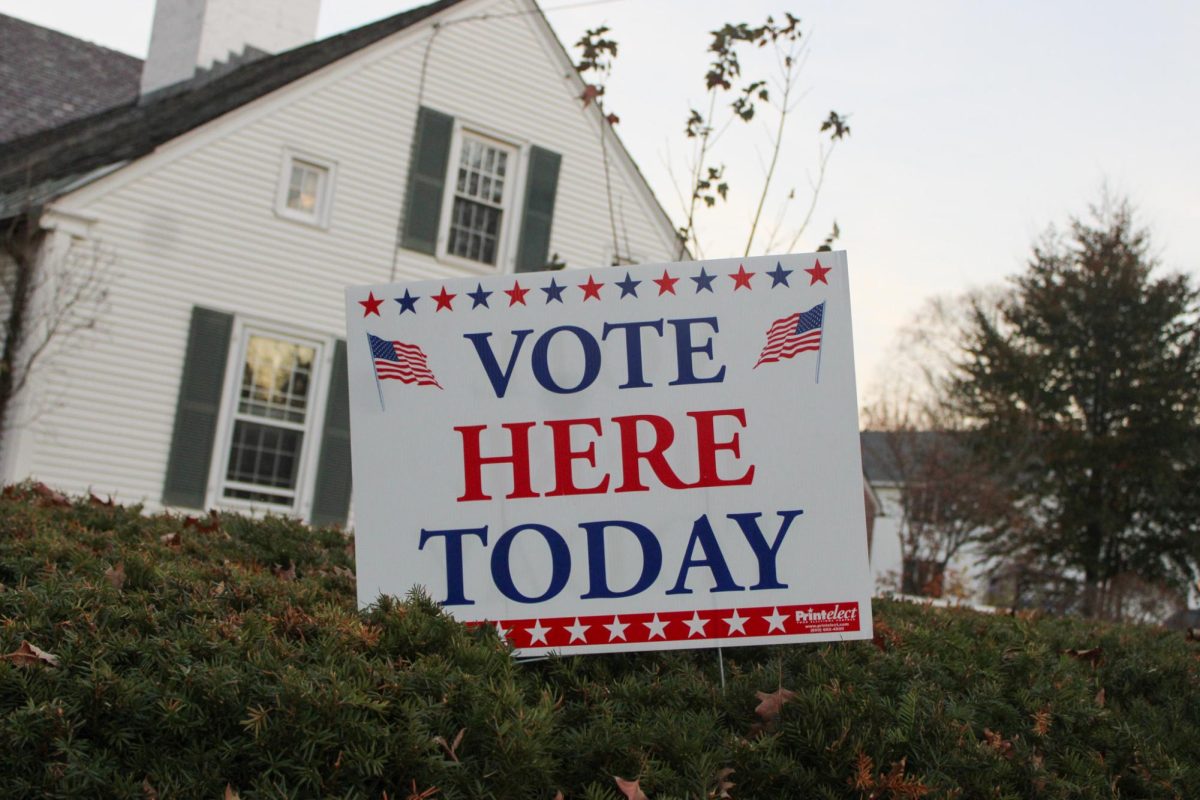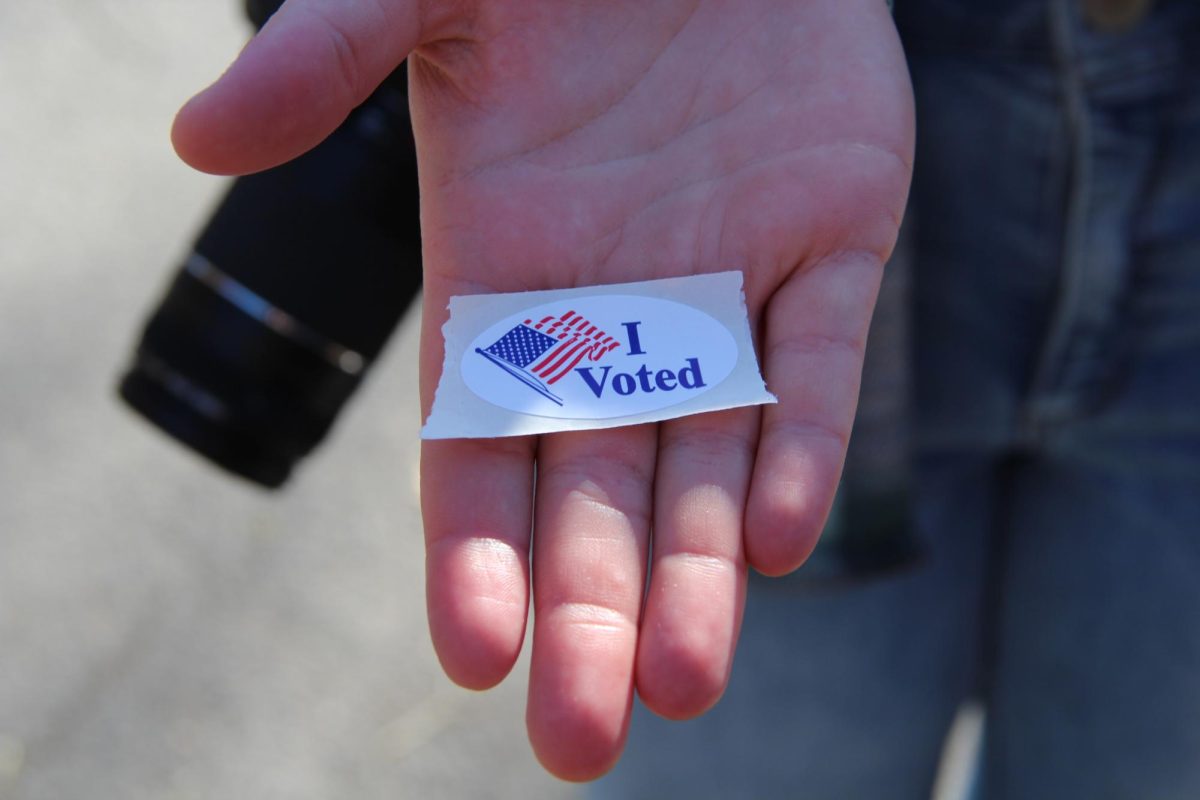In mid-October, University of Massachusetts Amherst Poll released a set of three reports looking at Massachusetts residents and their sentiments around the upcoming elections. In the past week, it released a set of five more reports, three of which are in collaboration with the League of Women Voters. The poll used for the reports has an oversample of women to look more closely at them.
The reports look at national feelings around the presidential campaign and how much people trust former President Donald Trump and Vice President Kamala Harris on different issues. They look at how people feel about voting, and what issues are most important, including a focus on in vitro fertilization (IVF) and health and familial issues. The final report looks at sentiments around Project 2025: immigration, racism and sexism.
The first report released looks at national support for candidates and how issues break down. The Poll gives Harris a two-point lead (48 – 46) over Trump, but has a three percent margin of error, so this is essentially a dead heat.
In the press release, Alexander Theodoridis, UMass political science professor, says, “This election is likely to be decided by a relative handful of electoral votes in whichever of the seven swing states ends up being decisive.”
There is a wide gender gap in presidential races; Harris has a seven-point advantage with women but Trump has a six-point advantage among men. The gap has been growing in the last couple of decades with 2004 and 2008 exit polls reporting only a seven point gap.

Along with a gender gap there is a large gap among education levels. The more educated people are, the more supportive they are of Harris, growing to a very large margin among postgrads.
Older people are also much more supportive of Trump than younger people. Jesse Rhodes, UMass political science professor, says in the press release, “[Older people] are less likely than younger Americans to say that Harris is intelligent, and less likely to say that the country is ready for an African American woman as president.”
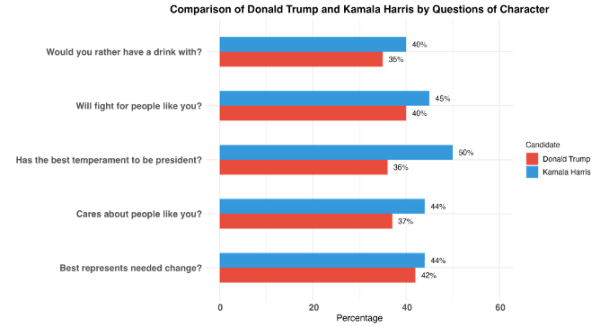
Haris does beat Trump among all voters when it comes to five questions of perceived personality and intentions. Looking at just women, the numbers are similar with two to four percent boosts in Harris’s favor on each question.
People also have widespread fear of election violence. Seven in 10 people report fearing election violence. With 65 percent being more scared of this violence if Trump wins the election. Trump has not said outright that he would concede the election if he lost, stating that he will only accept the results “if everything’s honest.”
The next two reports released are in collaboration with the League of Women Voters and look at “voting, election changes, and issue emphasis,” with an additional zoom in on banning in vitro fertilization.
The report finds that the economy is still the largest issue people are concerned with, even when looking solely at women. The economy is followed by the health of our democracy and inflation.
There is wide fear of election interference and or fraud. Sixty-five percent of respondents are concerned with, “the influence of fake news, disinformation and deep fakes.”
Only 12 percent of all respondents and 14 percent of women respondents had no fears about violence, voter suppression, domestic or foreign election interference. Only 39 percent of respondents are very confident their vote will be counted accurately.
The report finds that a majority of people support the abolition of the electoral college. Fifty-seven percent of all respondents and 62 percent of women respondents. Only 20 percent of women repondents support the electoral college.
In the press release, Celine Stewart, CEO of the League of Women Voters, says, “The Electoral College is an outdated racist relic with harmful implications for all voters.”
Director of UMass Poll and Provost Professor of political science Tatishe Nteta states, “In recent years, with increasingly close presidential elections, we have seen the Electoral College take center stage in selecting the nation’s next president as winners of the popular vote in 2000 and 2016 failed to secure enough Electoral College votes to become president.”
There is disagreement about how much removing the electoral college would hurt certain groups. Thirty to 32 percent of all respondents believe that removing the electoral college would hurt Republican candidates, small states and rural people. Twenty-four to 25 percent of women respondents believe removing the electoral college would hurt those groups.
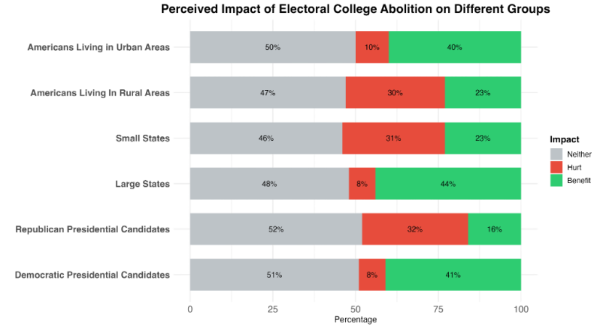
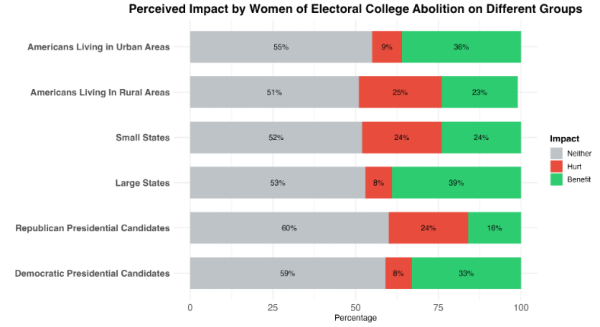
Perhaps the greatest attack against the electoral college is that only 61 percent of people believe their vote counts. This number moves to 70 percent for those living in swing states and 59 percent for those not.
But, Alexander Theodoridis, political science professor, says in the press release, “Non-swing state residents are vastly overestimating the impact of their votes for our nation’s highest office.”
There is majority support for many other large election changes, including automatic registration of all citizens, same day registration, showing government issued id to vote, increasing in person voting locations, creating nonpartisan committees to draw congressional and state legislature districts and multiple more.
The changes with the strongest support are requiring an id to vote and increasing the number of in person voting locations with both having over fifty percent of people strongly supporting them.
The fourth report, also in collaboration with the League of Women Voters, looks at issues regarding family and health.
It finds that 65 percent of all people oppose an abortion ban. Sixty-six percent of all respondents and 68 percent of women respondents oppose a ban on IVF. Only 11 percent of Republicans would support a ban.
Fifty percent of women respondents report knowing someone who got an abortion. Forty-five percent of all respondents say they know someone who got an abortion.
The economy lacks strong support. Thirty-two percent of respondents say the economy is good or excellent. Thirty-six percent say the economy is poor. Thirty-five percent report that their own economic situation is good or excellent, 31 percent women.
For a country that has a GDP 40 percent larger than the second largest economy in the world, it would make sense for there to be better views of the economy by its own citizens.
A majority of people also support a variety of healthcare reforms. Seventy-eight percent of all respondents support requiring businesses to provide paid maternity leave for mothers.
Sixty-six percent of all respondents support requiring paid paternity leave for fathers. Women have higher support with 70 percent supporting paternity leave. Forty-six percent of women strongly support it compared to 38 percent of all respondents.
People want to see less restrictive health insurance as well. Many people support the prohibition of denying coverage based on pre-existing medical conditions or because a woman is pregnant.
Sixty-one percent of people want to increase the child-tax credit from $2000 to $5000. A slight majority, 51 percent of all people and 58 percent of women, support the government ensuring that no more than seven percent of a family’s income is spent on childcare.
With studies finding that 70 percent of parents struggle to pay for childcare, it is not surprising that people want to see more of that financial burden relieved.
The final report looks at Project 2025, immigration and issues of sexism and racism.
When asked how hot or cold people felt about Project 2025 on a 0 to 100 scale, the average score was 25. Here is a word map of what one word people would use to describe Project 2025:

Democrats have heard more about it with 70 percent of Democrats saying they have heard some or a lot about it compared to only 45 percent of Republicans.
Many of the key policy recommendations from project 2025 face large opposition. Reducing civil rights for members of the LGBTQ+ community has 26 percent support, with 42 percent of women strongly opposing. Restricting access to contraception has only nine percent support and cutting funding for renewable energy research has 22 percent support.
Looking at issues of sexism, 31 percent of all respondents and 22 percent of women believe that women try to gain power by getting control over men. Twenty-eight percent of respondents say that women exaggerate issues at work, compared to 19 percent of women.
Sixty-two percent of respondents say women should be cherished and protected by men compared to 58 percent of women.
Ethan Walz can be reached at [email protected]


















